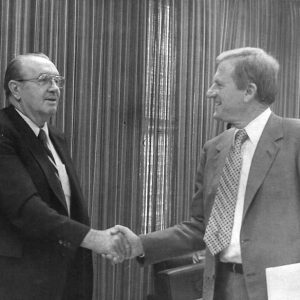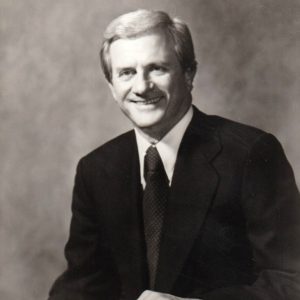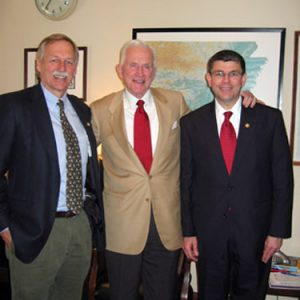calsfoundation@cals.org
Frank Broyles (1924–2017)
aka: John Franklin Broyles
After beginning his administrative career as an assistant coach at Baylor University in 1947, John Franklin (Frank) Broyles became one of the most familiar and powerful figures in all of college sports. In his years at the University of Arkansas (UA) in Fayetteville (Washington County), he built a diverse and excellent athletics program, plus a system of world-class athletic facilities in addition to establishing a winning tradition that includes the most football victories as head coach in Razorbacks history: 144 wins, far ahead of the runner-up coach, Lou Holtz, whose teams won sixty.
Frank Broyles was born on December 26, 1924, in Decatur, Georgia, to O. T. Broyles and Louise Solms Broyles. Broyles became a star quarterback at Georgia Tech, where he graduated in 1947 with a degree in industrial management. He led the football team to appearances in three bowl games. In 1944, he was named Southeast Conference Player of the Year. He was a member of the Orange Bowl, Cotton Bowl, Gator Bowl, and Georgia Tech halls of fame.
He married his high school sweetheart, Barbara Day, on May 6, 1945. They had four sons and twin daughters. Barbara Day Broyles died of complications from Alzheimer’s disease in October 2004. He remarried after his first wife’s death, wedding Guendaline Whitehead (known as Gen) on December 1, 2005, in Fort Smith (Sebastian County).
Broyles started his coaching career as an assistant at Baylor University in Texas in 1947, but he was soon back at Georgia Tech as offensive coordinator under head coach Bobby Dodd. In 1957, Broyles became head coach at the University of Missouri. A year later, he got his “dream job”—UA head coach. His teams won or shared seven Southwest Conference championships and won two of three Cotton Bowl games (1965 and 1976). The 1969 Texas game in Fayetteville, which President Richard Nixon attended, was supposedly the last major national football game played with all-white teams.
In the mid-1960s, Broyles’s teams won twenty-two straight games, the longest college football winning streak of the decade. A traditional rivalry between the Razorbacks and Darryl Royal’s University of Texas Longhorns helped bring those teams even more national attention. Broyles became the ABC television network’s chief color commentator for college football, a position he held for nine years.
Broyles was named Arkansas athletic director in 1973; he retired as head coach in 1976. By 2005, he had overseen thirty-four national championships, fifty-seven Southwest Conference championships, and twenty-seven Southeastern Conference championships. He also left his mark in the construction of facilities for basketball, track and field, and baseball by funding improvements in the amount of more than $200 million. His long tenure earned him the selection as Arkansas’s most influential sports figure of the twentieth century by the Arkansas Democrat-Gazette.
Broyles sent out of his ranks more than thirty former players who became college or professional coaches, including Barry Switzer, Johnny Majors, Joe Gibbs, and Jimmy Johnson; these coaches were responsible for numerous national championships and Super Bowl wins. Broyles’s reputation for producing high-caliber coaches began with his arrival at UA. Each year, the Broyles Trophy is presented to an outstanding assistant coach.
Broyles attracted his share of criticism and controversy, from accusations of being overindulgent to openly tyrannical. However, Broyles became an influential member of the university community and was a major fundraiser in a UA drive that, in 2005, topped one billion dollars. In 2007, the field at Donald W. Reynolds Razorback Stadium was named in his honor. The athletic center on the UA campus also bears his name, and in 2013, a bronze statue of Broyles was dedicated in front of the building.
Broyles was a leading figure and a respected figure in collegiate athletics in the twentieth century who brought athletic accolades to Arkansas. On December 31, 2007, he officially ended his career as UA’s athletic director, though he remained a consultant for the university. On August 14, 2017, Broyles died from complications of Alzheimer’s disease.
For additional information:
An Arkansas Legend: The Life & Legacy of Frank Broyles. Battle Ground, WA: Pediment Publishing, 2014.
Bowden, Bill. “Razorbacks’ Broyles Dies at 92.” Arkansas Democrat-Gazette, August 15, 2017, pp. 1A, 6A–7A.
Broyles, Frank, with Jim Bailey. Hog Wild: The Autobiography of Frank Broyles. Memphis: Memphis State University Press, 1979.
Broyles, J. Frank, and Robert D. Hay. Administration of Athletic Programs: A Managerial Approach. Englewood Cliffs, NJ: Prentice Hall, 1979.
“Frank Broyles.” David and Barbara Pryor Center for Arkansas Oral and Visual History. http://pryorcenter.uark.edu/interview.php?thisProject=Arkansas%20Memories&thisProfileURL=BROYLES-Frank&displayName=J.%20%20Frank%20Broyles&thisInterviewee=432 (accessed August 2, 2023).
Holt, Bob. “King of the Hill.” Arkansas Democrat-Gazette, August 15, 2017, pp. 1C, 4C–5C.
Suggs, Welch. “The Long Shadow of Frank Broyles.” Chronicle of Higher Education 51 (February 18, 2005): A40–42.
Ward, James. “Frank’s Final Score.” Arkansas Times, September 1990, pp. 32–37, 84–87.
James Kelton
University of Arkansas, Fayetteville
 Divergent Prosperity and the Arc of Reform, 1968–2022
Divergent Prosperity and the Arc of Reform, 1968–2022 Recreation and Sports
Recreation and Sports Clarence Bell and Frank Broyles
Clarence Bell and Frank Broyles  Frank Broyles
Frank Broyles  Snyder, Broyles, and Ross
Snyder, Broyles, and Ross 



Comments
No comments on this entry yet.